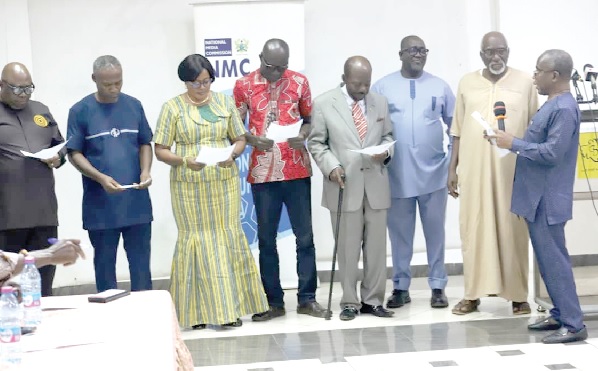
Accept criticisms in good faith: NMC advises journalists
THE Chairman of the National Media Commission (NMC), Yaw Boadu Ayeboafoh, has advised journalists to accept criticisms in good faith when they get it wrong sometimes.
He said that the failure to accept blame was one of the fundamental weaknesses of the media system in the country “where journalists profess that you have the right to criticise everybody but no one criticises you”.
“We are not the repository knowledge. Knowledge must be shared,” the chairman added.
He said the best form of regulating the media all over the world was self regulation, where journalists “understand that it is out of experience that we learn to do things better”.
The chairman also said that the more journalists made themselves available to interact with others, the better they educated themselves, would be well informed and helped to educate the masses.
Event
Mr Boadu-Ayeboafoh was speaking at the inauguration of the six-member Ashanti Regional Media Advisory Committee (RMAC) in Kumasi.
The committee is being Chaired by Paul Adu-Gyamfi, a former President of the Ghana Bar Association (GBA), and a former Chairman of the NMC.
Others are the General Coordinator of the RMAC national project, Jonathan Frimpong, and the Headmistress of the Effiduase SHS, Olivia Owusu Barnor.
The rest are the Ashanti Regional President of the Ghana Journalists Association, Kingsley Hope, a broadcasts journalist, Kwame Adinkra, and Ike Frimpong.
The committee, which would be established in other regions, will work with journalists and key stakeholders in those areas on how to protect journalists, combat disinformation and secure safe, free and responsible media practice, especially in this year’s electioneering.
Strategy
The Executive Secretary of NMC, George Sarpong, said “the strategy is to harness influential networks, integrity and expertise of industry players to protect journalists by connecting them with security agencies, the electoral commission, chiefs and religious leaders in times of need”.
He said each of the RMAC would consist of multi-ethnic, multi-religious and multi-disciplinary group of professionals, civil society, political and business leaders chosen on the basis of expertise, influence in society and commitment to human rights and ability to build inclusive societies.
Mr Sarpong said the nation’s march towards democratic consolidation demanded an informed citizenry, free and responsible media, independent journalists and an open information space.
He said as the nation prepared for the December elections this year, there were real issues of the safety of journalists.
Mr Sarpong said recent reports by Reporters Without Boarders showed deteriorating conditions of the safety of journalists, “at the same time, the nation is registering disinformation operations by various local political actors, and to some extent, malign international actors.
“If the current trend in both disinformation and safety of journalists are not reversed, they could impact negatively on the elections,” he said.
Mr Sarpong said addressing them would require action at both national and regional levels according to local peculiarities, hence the need for setting up of the committee.
Assurance
Mr Adu-Gyamfi gave the assurance that the committee would carry out its mandate creditably, and urged the media to give the committee the needed support to fulfill its tasks of ensuring sanity on media platforms in the region.
